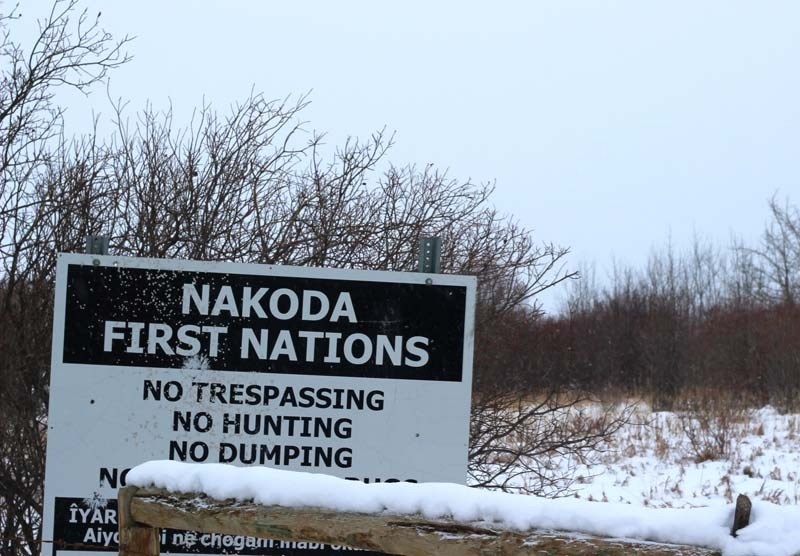The Stoney Nakoda Nation is looking to zone a significant area of land for commercial use to boost its revenue in the wake of low natural gas prices affecting the nation's bank account.
The Stoney Nakoda Nation is looking to zone a significant area of land for commercial use to boost its revenue in the wake of low natural gas prices affecting the nation's bank account. However, mistrust in the leadership combined with concerns of the terms of the vote has some community members recoiling from the referendum.
“It's extremely important that all First Nations in the country are able to participate in the economy, ” said Heather Carnahan, CEO of Stoney Nakoda Nation holdings and the referendum project lead. “The very first step to do that for reserve lands, like Stoney Nakoda reserve lands, is to have a referendum to designate land. ”
The nation's chiefs and councils have outlined nearly 3,000 hectares of land to be designated commercial with the bulk of it in the Morley area (4517.45 hectares) and the rest in Bighorn and Eden Valley. A vote is set for next week, Feb. 15.
By comparison, the town of Cochrane is roughly 3,000 hectares. The Stoney Nakoda Casino takes up approximately 0.79 hectares of land (85,000 square feet).
Carnahan stressed the importance the lands be designated so the nation can move forward with future commercial projects and generate revenue. Since the price of natural gas has dropped, the nation's revenue from resource royalties has fallen to $8 million in 2016/17 from $70 million in the 2008/09 fiscal year. Resource royalties in 2015 - $25.4 million - comprised approximately one-quarter of band revenues.
“In order to provide for services currently paid out of the nation's revenues, there has to be additional revenue sources found, ” Carnahan said. “Economic development is extremely important and has been prioritized by the tribal council for quite some time. ”
A majority “yes ” vote would amend the designation period from 49 years to 99; allow head leases to be made available to any entity (currently reserved for Stoney-owned Tribal entities); and the roughly 3,000 hectares of land, cut from various areas, will be zoned for commercial use. As well, a yes vote would mean the Nation would revoke an untimed-stamped land surrender agreement from 1930 to the YMCA, as the organization is no longer using the land. The reclaimed land will also be part of the designated land.
The nation is set to use a simple majority voting system, as outlined in the Indian Act. This means it won't be required for 50 per cent plus one of the population to vote, only the majority of the cast ballots must be in favour. From there, the Stoney Tribal Council can recommend the Government of Canada enact the designation.
“The thinking behind this whole land designation is for the purpose of economic development, ” said Jordie Marks, a Chiniki Tribal Council member.
Marks pointed to the success of earlier designated lands, which have been developed into a gas bar, Subway, Chiniki Cultural Centre and the Stoney Nakoda Casino and Resort.
“We chose this many sites because each band contributed to the sites, ” Marks said, adding there is potential for further community discussions regarding the land, and that it would be possible for a Band Council Resolution (BCR) to revoke parcels of designated land, if desired by the community.
However, many Stoney members are opposing the proposed referendum citing a lack of notice, that the vote carries too many outcomes and worries the plan might not result in the potential revenues it promises.
Band member Rachel Snow said she believes the community consultation talks are nothing more than “fluff ” discussions, and that the leadership will not act on community suggestions. Snow also said there hasn't been enough thought put into the cultural and environmental value of the lands.
“Whether they are specific cultural sites or sites where we harvest, those lands need to be protected. They are part of the fabric of who we are as Iyarhe Nakoda people. ”
Snow also noted the perceived lack of community consultation.
“From the time that it was supposedly posted, Jan. 3, to the actually vote date, Feb. 15, is a very quick period of time on an issue that's going to basically result in selling some parcels of land. ”
Tito Clarke said he fears the 99-year lease holds the equivalence to a land sale.
“Right now it's being touted as investing in our future. I really don't share that sentiment, ” Clarke said. “
“The people are more worried of the unseen consequences further down the road ... We're not even thinking about the economical development - that's just skin deep. ”
Trina Daniels echoed these concerns, adding one day, she fears there will be little to no lands left to call home for the Stoney people.
“When we sell all the land where are they going to go - where's home? ” she said, referring to the future generations. “Where is home? We sold it all. ”
